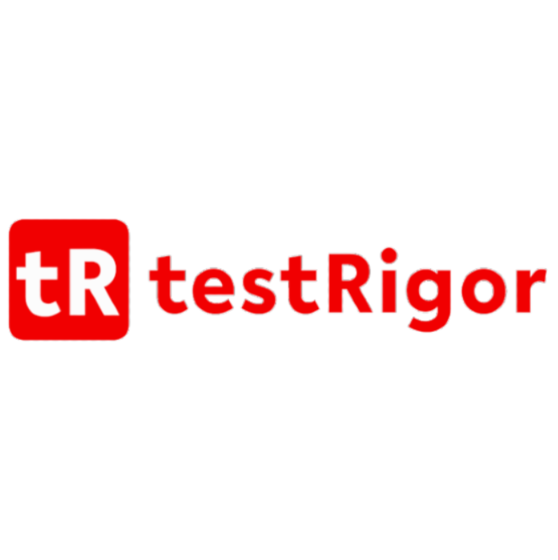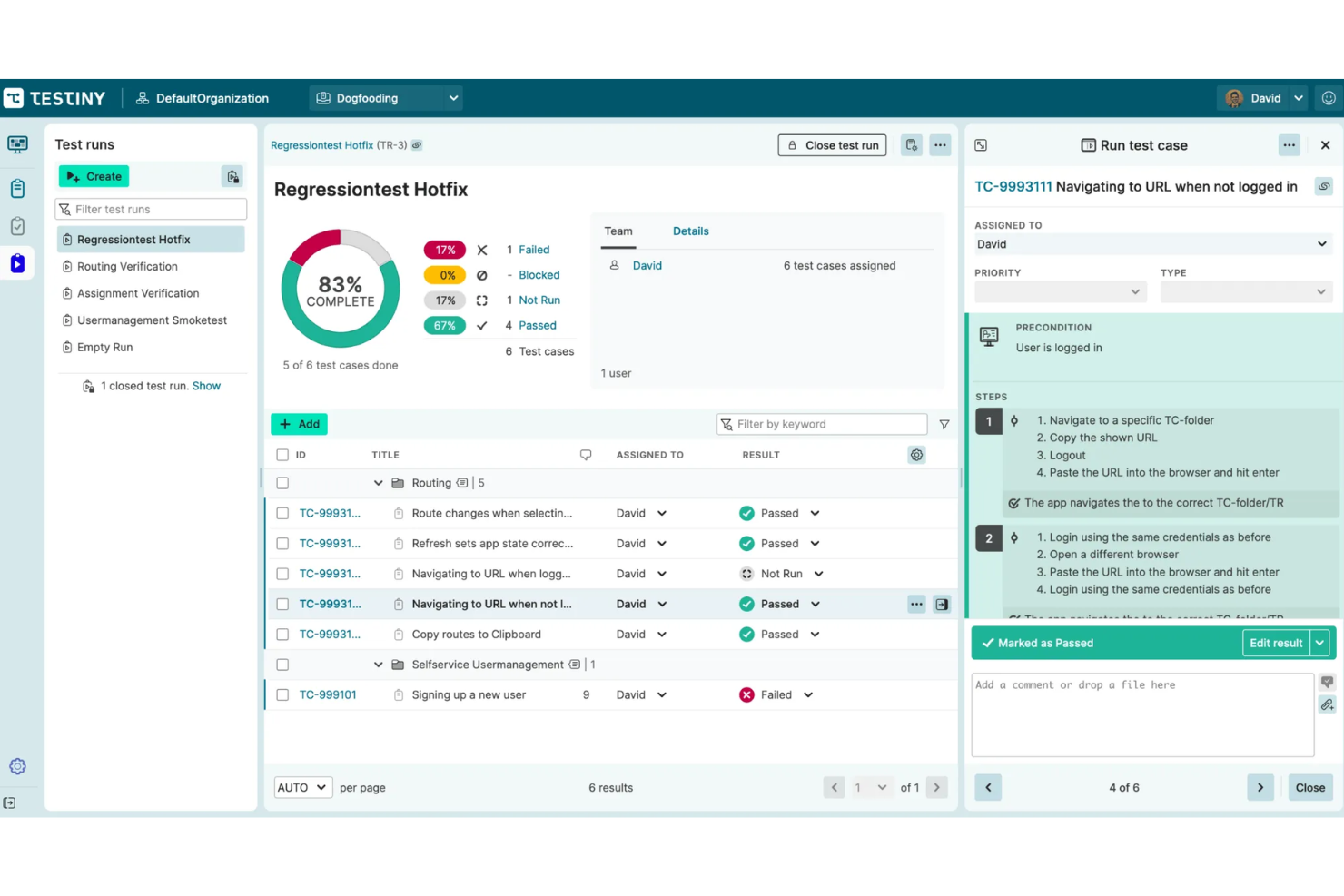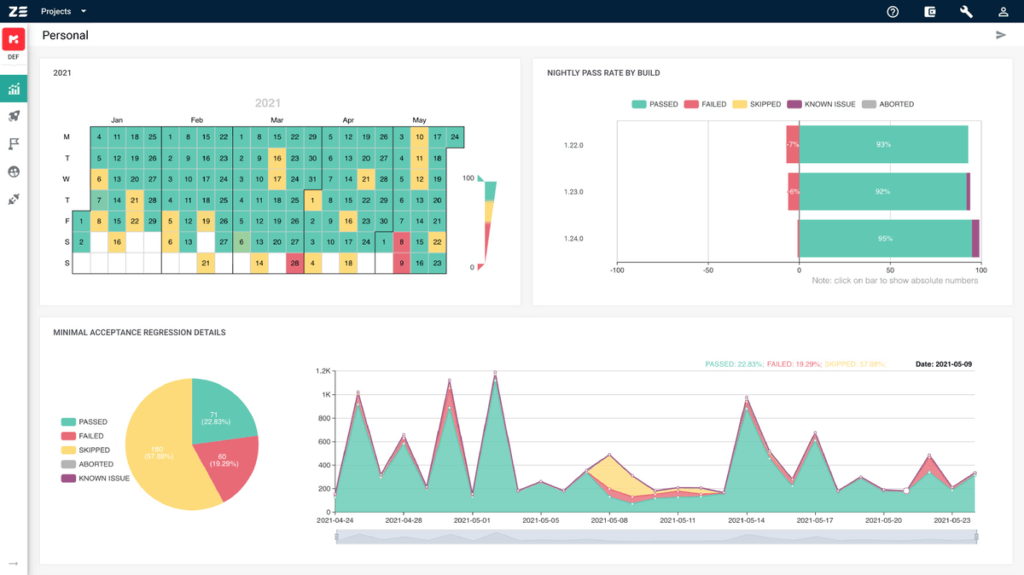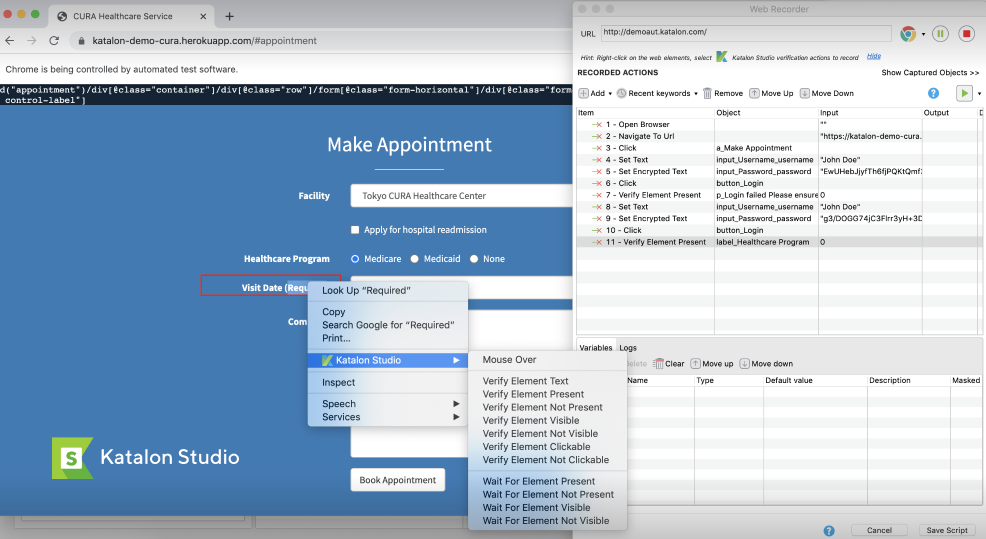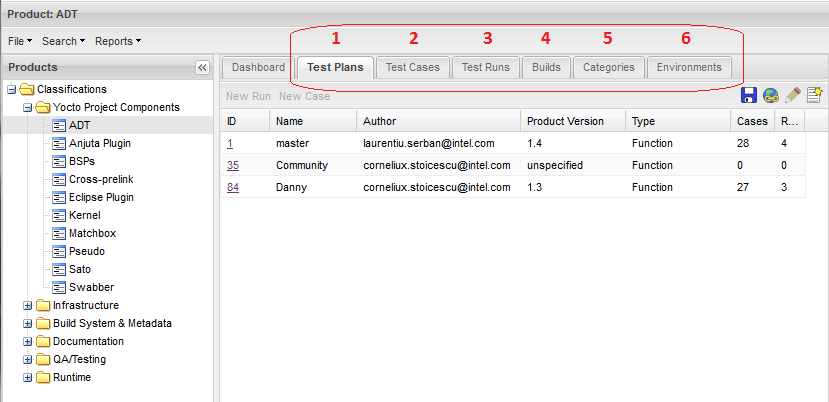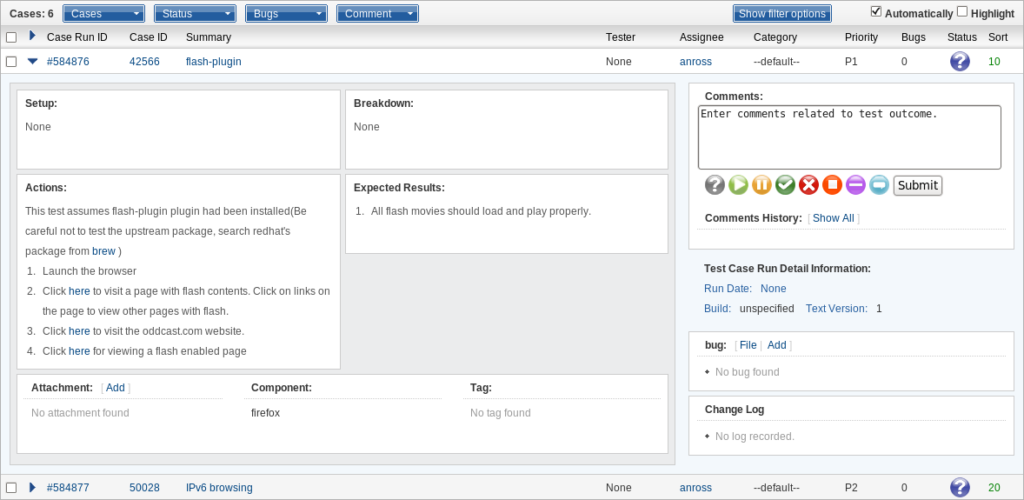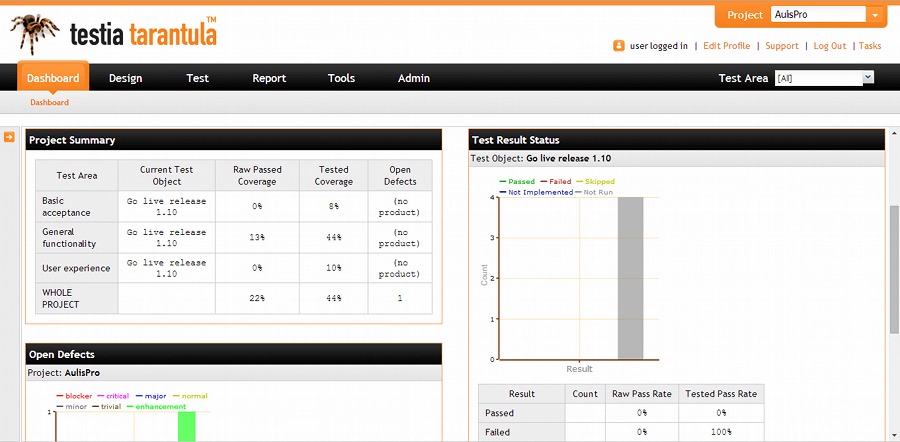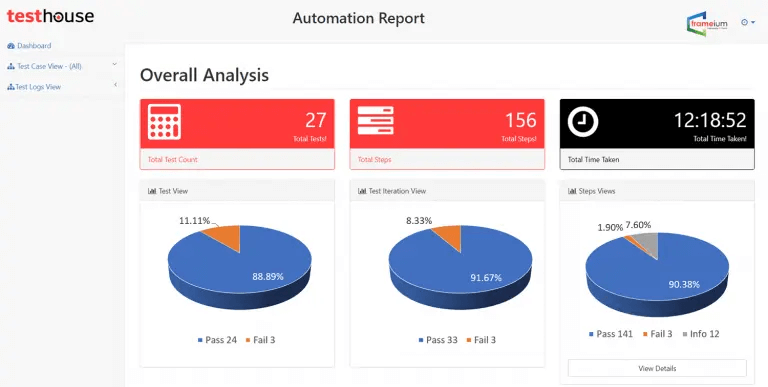Best Open Source Test Management Tools Shortlist
Here’s my shortlist of the best open source test management tools:
Our one-on-one guidance will help you find the perfect fit.
Test management doesn’t fall apart all at once—it slowly becomes messy. Maybe you’re jumping between spreadsheets, scattered tools, and outdated test cases. Maybe no one’s clear on what’s been tested, what passed, or who’s doing what. And the worst part? Bugs still slip through.
I’ve tested and used a wide range of open source test management tools with teams shipping everything from internal apps to customer-facing platforms. Some tools help bring structure and visibility without locking you into a rigid process—or draining your budget. Others, not so much.
In this guide, I’ll walk you through the best open source options out there—what they’re good at, where they fall short, and how to know which one fits your team.
Why Trust Our Software Reviews
We’ve been testing and reviewing SaaS development software since 2023. As tech experts ourselves, we know how critical and difficult it is to make the right decision when selecting software. We invest in deep research to help our audience make better software purchasing decisions.
We’ve tested more than 2,000 tools for different SaaS development use cases and written over 1,000 comprehensive software reviews. Learn how we stay transparent & check out our software review methodology.
Best Open Source Test Management Tools Summary
This comparison chart summarizes pricing details for my top open source test management tools selections to help you find the best one for your budget and business needs.
| Tool | Best For | Trial Info | Price | ||
|---|---|---|---|---|---|
| 1 | Best for agile teams | Free plan available | From $14.50/user/month | Website | |
| 2 | Best for continuous testing | Not available | Free to use | Website | |
| 3 | Best for beginners | Free plan available + free demo | From $183/user/month | Website | |
| 4 | Best for no-code automation | Free trial available + free demo | From $300/month (billed annually) | Website | |
| 5 | Best for Mozilla users | Not available | Free to use | Website | |
| 6 | Best for API testing | Not available | Free to use | Website | |
| 7 | Best for managing test cases | Not available | Free to use | Website | |
| 8 | Best for DevOps integration | Free demo available | From $14.78/user/month | Website | |
| 9 | Best for small development teams | Not available | Free to use | Website | |
| 10 | Best for small projects | Not available | Free to use | Website |
-

Docker
Visit WebsiteThis is an aggregated rating for this tool including ratings from Crozdesk users and ratings from other sites.4.6 -

Pulumi
Visit WebsiteThis is an aggregated rating for this tool including ratings from Crozdesk users and ratings from other sites.4.8 -

GitHub Actions
Visit Website
Best Open Source Test Management Tool Reviews
Below are my detailed summaries of the best open source test management tools that made it onto my shortlist. My reviews offer a detailed look at the key features, pros & cons, integrations, and ideal use cases of each tool to help you find the best one for you.
Testiny is a test management tool designed for both manual and automated testing, catering to agile teams. It provides an intuitive interface for managing test cases and generating insightful reports. The platform is ideal for teams looking to enhance their testing processes and collaboration.
Why I picked Testiny: Testiny caters specifically to agile teams, offering features like real-time collaboration and customizable user permissions. Its seamless integration with platforms like Jira, GitLab, and GitHub makes it easy to incorporate into your existing workflow. The tool's ability to track metrics and generate detailed reports provides valuable insights into your testing processes. Additionally, Testiny's support for data migration ensures a smooth transition from previous tools.
Standout features & integrations:
Features include effortless test case management that allows your team to organize and prioritize test cases efficiently. Real-time collaboration is a standout, letting team members work together seamlessly. The tool also offers customizable user permissions, giving you control over who can access and modify test information.
Integrations include Jira, GitLab, GitHub, Slack, Asana, Trello, Azure DevOps, Bitbucket, Jenkins, and Confluence.
Pros and cons
Pros:
- Data migration support
- Customizable permissions
- Real-time collaboration
Cons:
- Initial setup complexity
- Limited offline access
Zebrunner is a test management tool designed for continuous testing, primarily catering to development teams focused on automation. It provides real-time testing insights and helps teams optimize their testing processes. The tool is ideal for those looking to integrate testing seamlessly into their continuous integration and delivery pipelines.
Why I picked Zebrunner: Zebrunner excels in continuous testing environments, offering features like real-time reporting and test automation capabilities. It provides detailed dashboards that give your team insights into test performance and issues. The tool's ability to support parallel testing increases efficiency and reduces test execution time. Additionally, its customizable notifications keep your team informed about test results and updates.
Standout features & integrations:
Features include advanced reporting that provides your team with detailed insights into test executions. The tool also supports parallel test execution, which speeds up the testing process significantly. Zebrunner offers customizable notifications, ensuring your team stays updated on test progress and results.
Integrations include Jenkins, Slack, Jira, GitHub, GitLab, Bitbucket, TestRail, TestNG, Cucumber, and Selenium.
Pros and cons
Pros:
- Customizable notifications
- Parallel test execution
- Real-time reporting
Cons:
- Occasional performance lags
- Learning curve for beginners
Katalon Studio is an automated testing tool that serves both beginners and experienced testers. It offers a user-friendly interface and supports web, API, mobile, and desktop testing. This makes it an ideal choice for teams looking to simplify their testing processes without a steep learning curve.
Why I picked Katalon Studio: Katalon Studio is perfect for beginners, featuring a straightforward interface and built-in templates that make test creation easy. Its comprehensive tutorials and community support help you get started quickly. The tool’s record-and-playback feature simplifies test automation for those new to coding. Additionally, it offers cross-platform testing, allowing you to test across different environments effortlessly.
Standout features & integrations:
Features include a keyword-driven testing approach, which simplifies test creation for users with limited coding experience. The tool also features a robust data-driven testing capability, allowing you to run tests with multiple data sets. Katalon Studio offers built-in analytics, providing insights into your testing activities and results.
Integrations include Jenkins, JIRA, qTest, TestRail, Git, Slack, Kobiton, Sauce Labs, BrowserStack, and Microsoft Teams.
Pros and cons
Pros:
- Record-and-playback feature
- Comprehensive tutorials
- Beginner-friendly interface
Cons:
- Basic reporting capabilities
- Occasional performance slowdowns
testRigor is a generative AI-based test automation tool that lets your team create automated tests using plain English commands. This approach makes it accessible for both technical and non-technical team members to develop and maintain tests.
It supports cross-browser and cross-platform testing within a single test. This means you can ensure your application works seamlessly across different browsers and devices without creating separate tests for each environment. Additionally, testRigor offers a test recorder, which allows you to quickly create tests by recording user interactions, further simplifying the test creation process.
Other features include the ability to test native and hybrid mobile applications for both iOS and Android platforms, ensuring comprehensive mobile testing coverage. testRigor also supports API testing, allowing you to invoke APIs, validate return codes, and store results, which is essential for backend testing.
testRigor offers a free open-source plan with essential AI-based features, API tests, email tests, and 2FA testing. This option provides unlimited test cases but only includes support for Ubuntu-based browsers. More advanced features are available with testRigor's paid plans.
Integrations include Jira, TestRail, Zephyr, XRay, ReportPortal, Google Cloud Build, SauceLabs, LambdaTest, BrowserStack, Gitlab, Github Actions, Jenkins, Spinnaker, AWS CodePipeline, Travis, and CircleCI.
Testopia is a test management extension for Bugzilla, primarily used by teams within the Mozilla community. It helps users manage test cases, test plans, and test runs efficiently. The tool is ideal for teams already using Bugzilla and looking to enhance their testing capabilities.
Why I picked Testopia: Testopia is tailored for Mozilla users, integrating seamlessly with Bugzilla to offer a unified testing environment. It provides functionalities like test case management and execution tracking, making it a valuable addition for teams already invested in Bugzilla. The tool’s open-source nature allows for customization, which is beneficial for users needing specific features. Additionally, its familiar interface is a plus for those already accustomed to Bugzilla.
Standout features & integrations:
Features include comprehensive test case management, allowing your team to create, organize, and execute test cases with ease. The tool offers execution tracking, helping you monitor the progress and results of your test runs. Testopia also supports test plan management, letting you organize your testing efforts in a structured manner.
Integrations include Bugzilla and other custom integrations through its open-source capabilities.
Pros and cons
Pros:
- Customizable for specific needs
- Familiar interface for Mozilla users
- Seamless Bugzilla integration
Cons:
- Limited support for non-Mozilla users
- Limited to Bugzilla users
QuAck is an open-source test management tool designed for teams focused on API testing. It serves developers and testers who require a platform to organize and manage their API test cases effectively. The tool is ideal for those looking to streamline their API testing processes and improve collaboration within the team.
Why I picked QuAck: QuAck is tailored for API testing, offering features that make it easy for your team to manage and execute API tests. It supports test case versioning, which helps track changes and maintain consistency across your testing efforts. The tool's intuitive interface allows you to organize test suites and monitor results efficiently. Additionally, QuAck's open-source nature provides the flexibility to customize the tool according to your team's specific needs.
Standout features & integrations:
Features include a user-friendly interface that simplifies the process of managing and executing API tests. The tool provides test case versioning, allowing your team to track changes and ensure consistency. QuAck also supports detailed reporting, giving you insights into the performance and results of your API tests.
Integrations include Jenkins, GitHub, GitLab, Slack, JIRA, Bitbucket, Trello, Azure DevOps, Bamboo, and Confluence.
Pros and cons
Pros:
- Intuitive interface
- Supports test case versioning
- Tailored for API testing
Cons:
- Initial setup complexity
- Limited to API testing
Nitrate is a full-featured test case management system designed to help teams efficiently create and manage test plans, cases, and runs. It supports multiple authentication backends and provides fast search capabilities for test artifacts.
Why I picked Nitrate: Nitrate offers ease of use in creating and managing test life cycles with plans, cases, and runs. Your team can benefit from powerful access control for each plan, run, and case, ensuring appropriate permissions. Additionally, Nitrate includes an extensible issue tracker that allows tracking external issues with test cases and test case runs, enhancing your workflow.
Standout features & integrations:
Features include multiple and configurable authentication backends, such as Bugzilla and Kerberos, fast search for plans, cases, and runs, and accessibility through XMLRPC APIs.
Integrations include Bugzilla and Kerberos.
Pros and cons
Pros:
- Fast search capabilities for test artifacts
- Multiple authentication backends supported
- Ease of use in creating test life cycles
Cons:
- May require technical knowledge for setup
- Limited information on third-party integrations
Tuleap is an open-source tool designed for project management and test management, catering to teams focused on DevOps and agile methodologies. It provides functionalities for managing requirements, tracking issues, and automating workflows. This makes it a valuable asset for teams looking to integrate their development and operations processes seamlessly.
Why I picked Tuleap: Tuleap offers strong DevOps integration capabilities, making it ideal for teams that need to automate their development and operations workflows. It provides features like customizable workflows and comprehensive tracking, which help your team maintain control over complex projects. The tool’s open-source nature allows for extensive customization, letting you tailor it to your specific needs. Additionally, Tuleap supports agile methodologies, providing flexibility for iterative development.
Standout features & integrations:
Features include comprehensive project management tools that let your team manage requirements, track issues, and plan releases effectively. The tool supports customizable workflows, allowing you to adapt processes to match your team's needs. Tuleap also offers detailed tracking capabilities, providing insights into project progress and performance.
Integrations include Jenkins, Git, SVN, Gerrit, GitHub, GitLab, Redmine, Slack, JIRA, and Trello.
Pros and cons
Pros:
- Supports agile methodologies
- Customizable workflows
- Strong DevOps integration
Cons:
- Requires technical expertise
- Initial setup complexity
Tarantula is a web-based test management tool that helps teams organize and track their software testing efforts. It’s built with testers in mind and focuses on planning, tracking, and analyzing test activities.
Why I picked Tarantula: Tarantula lets you create and manage test plans, organize test cases into structured folders, and monitor test execution progress across different projects. Your team can assign tests, track their status, and see results in real-time using dashboards. It also includes user role controls so you can manage permissions. Since it’s open source, you can host it on your own servers and customize it to fit your workflow. This setup makes it a good fit if your team’s small and wants more control over the tool.
Standout features & integrations:
Features include a tagging system for tests, support for multiple test environments, and version control for test cases. You can also reuse test steps and link tests to related issues. The tool tracks who ran which test and when, giving your team more clarity.
Integrations include Bugzilla, JIRA, Redmine, MantisBT, Trac, FogBugz, TestLink, Jenkins, and Git.
Pros and cons
Pros:
- Good visibility into test history
- Easy to modify or extend
- Self-hosted for full control
Cons:
- Interface feels a bit outdated
- Needs manual setup and maintenance
TestHouse is a test case management system designed for QA and development teams working on small projects. It helps teams organize and manage their test cases efficiently, providing a straightforward solution for test management. The tool is ideal for those who need a simple and effective way to handle testing processes.
Why I picked TestHouse: TestHouse is tailored for small projects, offering a lightweight setup that doesn't overwhelm your team. It's built on modern technologies like ASP.NET Core and Blazor, ensuring it stays up-to-date with current development practices. The system's simplicity makes it easy for teams to implement without needing extensive technical knowledge. Additionally, its open-source nature allows for customization, providing flexibility for your specific needs.
Standout features & integrations:
Features include a simple user interface that makes it easy for your team to navigate and manage test cases. The tool supports basic test management functionalities, which are perfect for small teams. TestHouse also offers easy setup, requiring minimal technical expertise to get started.
Integrations include GitHub, Jenkins, Slack, Azure DevOps, Jira, Trello, Asana, Bitbucket, GitLab, and Microsoft Teams.
Pros and cons
Pros:
- Simple user interface
- Modern technology stack
- Lightweight setup
Cons:
- Basic reporting capabilities
- Limited advanced features
Other Open Source Test Management Tools
Here are some additional open source test management tools options that didn’t make it onto my shortlist, but are still worth checking out:
- TestCaseDB
For database testing
- Kiwi TCMS
For detailed reporting
- TestLink
For customizability
- BugBug
For browser-based testing
Open Source Test Management Tool Selection Criteria
When selecting the best open source test management tools to include in this list, I considered common buyer needs and pain points like ease of integration and customization options. I also used the following framework to keep my evaluation structured and fair:
Core Functionality (25% of total score)
To be considered for inclusion in this list, each solution had to fulfill these common use cases:
- Test case management
- Test execution tracking
- Defect tracking integration
- Reporting and analytics
- User role management
Additional Standout Features (25% of total score)
To help further narrow down the competition, I also looked for unique features, such as:
- Customizable workflows
- Automated test execution
- Real-time collaboration tools
- API testing capabilities
- Advanced reporting dashboards
Usability (10% of total score)
To get a sense of the usability of each system, I considered the following:
- Intuitive user interface
- Easy navigation
- Minimal learning curve
- Clear layout and design
- Accessibility of features
Onboarding (10% of total score)
To evaluate the onboarding experience for each platform, I considered the following:
- Availability of training videos
- Interactive product tours
- Pre-built templates
- Webinars and tutorials
- Migration support
Customer Support (10% of total score)
To assess each software provider’s customer support services, I considered the following:
- Availability of live chat support
- Comprehensive help documentation
- Response time for queries
- Availability of community forums
- Multi-channel support options
Value For Money (10% of total score)
To evaluate the value for money of each platform, I considered the following:
- Competitive pricing structure
- Features offered at each pricing tier
- Flexibility in pricing plans
- Cost of add-ons or extras
- Free trial or demo availability
Customer Reviews (10% of total score)
To get a sense of overall customer satisfaction, I considered the following when reading customer reviews:
- Frequency of positive feedback
- Commonly mentioned pain points
- Overall user satisfaction ratings
- Feedback on customer service
- Mention of specific standout features
How to Choose Open Source Test Management Tool
It’s easy to get bogged down in long feature lists and complex pricing structures. To help you stay focused as you work through your unique software selection process, here’s a checklist of factors to keep in mind:
| Factor | What to Consider |
| Scalability | Ensure the tool can grow with your team. Look for features that support increasing test cases and users without compromising performance. |
| Integrations | Check if it integrates with your existing tools like Jira, Jenkins, or GitHub. This will streamline your workflow and reduce time spent switching platforms. |
| Customizability | The tool should allow you to tailor workflows and reports to fit your team's specific needs, ensuring it aligns with your processes. |
| Ease of Use | Opt for a tool with an intuitive interface and simple navigation to reduce the learning curve and get your team up and running quickly. |
| Budget | Consider all costs, including hidden fees for add-ons or extra features. Make sure the tool fits within your budget and offers good value for its price. |
| Security Safeguards | Verify the tool has robust security measures like data encryption and user access controls to protect your sensitive information. |
| Support | Look for comprehensive support options, including documentation, community forums, and live support, to assist your team when issues arise. |
| Features | Identify the core features your team needs and ensure the tool covers them, such as test case management, defect tracking, and reporting. |
Trends in Open Source Test Management Tools
In my research, I sourced countless product updates, press releases, and release logs from different open source test management tools vendors. Here are some of the emerging trends I’m keeping an eye on:
- AI-Driven Insights: AI is being used to analyze test results and provide actionable insights. This helps teams identify patterns and predict where issues might occur. Some tools are incorporating AI to suggest test cases and improve test coverage.
- Collaborative Testing Environments: There's an increasing focus on fostering teamwork with real-time collaboration features. Vendors are adding functionalities that let multiple users work on test cases simultaneously, enhancing productivity and communication.
- Shift-Left Testing: More tools are supporting early testing in the development cycle. This trend helps developers catch bugs sooner, reducing time and cost. Tools are integrating features that encourage testing as early as the requirements phase.
- Enhanced Reporting and Visualization: Vendors are improving reporting features to provide more detailed and visually appealing insights. Interactive dashboards and customizable reports are becoming standard, helping teams better understand and act on test data.
- Increased Focus on Security Testing: As security becomes a priority, tools are adding features specifically for security testing. This includes vulnerability scanning and compliance checks, ensuring that applications are not only functional but also secure.
What Are Open Source Test Management Tools?
Open source test management tools are software solutions that help teams organize and manage their testing processes. QA professionals, developers, and project managers generally use these tools to improve efficiency and collaboration in testing activities. Features like test case management, defect tracking, and reporting capabilities support efficient workflows and enhance team productivity. Overall, these tools provide a cost-effective way to ensure software quality and deliver successful projects.
Features of Open Source Test Management Tools
When selecting open source test management tools, keep an eye out for the following key features:
- Test case management: Allows teams to create, organize, and manage test cases efficiently, ensuring comprehensive test coverage.
- Defect tracking: Helps identify, track, and manage bugs throughout the testing process, improving software quality.
- Reporting and analytics: Provides insights into test results and progress, aiding in decision-making and strategy planning.
- Customizable workflows: Lets teams tailor the tool to fit their specific processes, enhancing flexibility and adaptability.
- Integration capabilities: Ensures smooth connectivity with other tools like Jira and Jenkins, streamlining workflows.
- Real-time collaboration: Enables multiple users to work on test cases simultaneously, boosting team productivity and communication.
- Security testing: Offers features for vulnerability scanning and compliance checks, ensuring application security.
- Automated test execution: Facilitates running tests automatically, saving time and reducing manual effort.
- Interactive dashboards: Provides visual representations of data, helping teams quickly understand and act on test information.
- Test case versioning: Tracks changes to test cases over time, maintaining consistency and history.
Benefits of Open Source Test Management Tools
Implementing open source test management tools provides several benefits for your team and your business. Here are a few you can look forward to:
- Cost-effectiveness: Being open source, these tools reduce licensing fees, making them budget-friendly for teams.
- Flexibility: Customizable workflows and open-source nature allow you to adapt the tool to fit your specific needs.
- Enhanced collaboration: Real-time collaboration features improve team communication and productivity.
- Improved quality: With features like defect tracking and automated test execution, these tools help deliver higher quality software.
- Better decision-making: Reporting and analytics provide valuable insights into testing activities, aiding strategic planning.
- Security assurance: Built-in security testing features ensure your applications are safe from vulnerabilities.
- Scalability: These tools grow with your team, supporting increased test cases and users without sacrificing performance.
Costs and Pricing of Open Source Test Management Tools
Selecting open source test management tools requires an understanding of the various pricing models and plans available. Costs vary based on features, team size, add-ons, and more. The table below summarizes common plans, their average prices, and typical features included in open source test management software solutions:
Plan Comparison Table for Open Source Test Management Tools
| Plan Type | Average Price | Common Features |
| Free Plan | $0 | Basic test case management, limited user roles, and community support. |
| Personal Plan | $5-$15/user/month | Test case management, defect tracking, basic reporting, and limited integrations. |
| Business Plan | $20-$40/user/month | Advanced reporting, customizable workflows, real-time collaboration, and more integrations. |
| Enterprise Plan | $50-$100/user/month | Full feature set, priority support, security testing, and extensive customization options. |
Open Source Test Management Tool FAQs
Here are some answers to common questions about open source test management tools:
What are the requirements for a test management tool?
When choosing a test management tool, consider integration with existing tools and processes, ease of use, scalability, and collaboration features. Reporting and analytics are also key, along with security and compliance measures. Ensure the tool fits your budget and licensing model while planning for a smooth migration.
How do you evaluate test management tools?
Start by assessing your current situation and defining your requirements. Establish an evaluation team to research possible tools, read reviews, and consider scalability, integration, and ease of use. Check for features that match your needs and evaluate their support and community engagement.
How can you ensure data security in open source tools?
To secure data in open source tools, ensure they offer encryption for data in transit and at rest. Verify the tool’s compliance with industry standards and its ability to manage user access controls. Regular updates and patches are essential to protect against vulnerabilities.
Can open source test management tools integrate with CI/CD pipelines?
Yes, many open source test management tools offer integrations with CI/CD pipelines like Jenkins or GitLab. These integrations facilitate automated testing within your development workflow, ensuring tests run smoothly with each code change and enhancing the overall development process.
How do you migrate to a new test management tool?
Migration involves planning your data transfer, configuring the new tool, and training your team. Start by exporting data from your current system, then import it into the new tool. Ensure your team understands the new system through training sessions, tutorials, or product tours.
What support options are available for open source tools?
Open source tools often provide community support through forums and user groups. Some offer documentation, FAQs, and tutorials. For more structured support, check if the tool offers paid options like priority support or dedicated account management to assist with any issues.
What's Next?
Boost your SaaS growth and leadership skills.
Subscribe to our newsletter for the latest insights from CTOs and aspiring tech leaders.
We'll help you scale smarter and lead stronger with guides, resources, and strategies from top experts!





